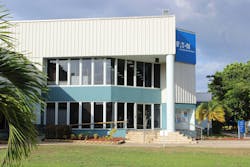Eaton Installs Microgrid with Solar and Battery Storage to Power Manufacturing Facility in Puerto Rico
Eaton and Enel North America have installed a clean energy microgrid system at Eaton's Arecibo manufacturing facility in Puerto Rico, which produces circuit breakers for homes, buildings, and industrial applications.
The project will help reduce the facility’s carbon footprint, boosting energy resilience and bolstering community infrastructure. Eaton has also implemented efficiency measures using its intelligent power management technologies to reduce its energy footprint.
“Communities and businesses everywhere need far more sustainable, resilient, and affordable power,” said Mike Yelton, President of the Electrical Sector at Eaton. “The projects at our Arecibo manufacturing facility provide a blueprint on how to put the energy transition to work—delivering important benefits for the community and our business."
The project will generate more than half of the facility’s energy requirements to help reduce emissions, offset energy costs, and ensure resiliency during grid outage events. The microgrid system includes 5 MWac of solar PV, approximately 1.1 MW of battery storage, and existing onsite generators.
Eaton will be at Microgrid Knowledge 2024
Happening April 22-24 in Baltimore at the Inner Harbor
20+ Sessions on All Facets of Microgrid Development
Join the Revolution in Energy: Register Here
The microgrid is capable of withstanding Category 5 hurricane-force winds and providing added value in normal grid-connected operations by generating renewable energy. This energy can be consumed, stored, and delivered back to the local grid to reduce stress on the island’s utility infrastructure.
Eaton aims to reduce carbon emissions across its operations by 50% by 2030, and sustainability at its Arecibo facility is part of achieving this target.
The clean energy project demonstrates Eaton’s Everything as a Grid approach to the energy transition for flexible energy systems, supporting more resilient, efficient, and affordable power.
Enel North America built, owned, and operated the system on behalf of Eaton and financed the project under an energy-as-a-service model, helping Eaton transform its investment in the microgrid system from a capital expense to an operational expense.
Eaton provided installation expertise and key technologies for the microgrid system, including its Power Xpert microgrid solutions and power distribution equipment.
Eaton and Enel North America are now beginning construction on a second microgrid at Eaton's Las Piedras manufacturing facility to enhance energy resiliency in Puerto Rico.
“As the impacts of climate change worsen, large energy users are stepping up to power their facilities sustainably,” said Matt Barnes, Head of Distributed Energy Solutions at Enel North America. "The urgency to deploy microgrids—especially in regions with vulnerable electrical infrastructure—has never been greater, and Enel is delivering the clean and flexible systems that the energy transition requires.”





